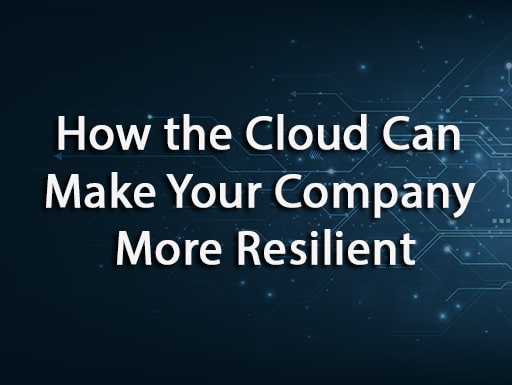How the Cloud Can Make Your Company More Resilient
October 25, 2022

Backup and recovery solutions are recognized for their data protection capabilities. They empower companies to restore lost, stolen, or compromised data to its original state. However, today’s organizations are leveraging backup and recovery for resilience.
Data resilience has become important because of the prevalence of ransomware attacks, the cost of unscheduled downtime, and the demand for high levels of availability.
Ransomware uses encryption to lock down company systems, generating vast amounts of downtime. The Los Angeles Times reported that a ransomware attack in June of 2021 sidetracked an entrepreneur’s small business for an entire year, leading him to lose half his customers.
While backup and recovery can be achieved by combining a secondary data center with snapshots and replication tools, a hybrid cloud provides an attractive option.
The cloud can increase your company’s resilience by providing off-site backup that creates an air gap and allows for rapid recovery, ensuring optimum recovery point objectives (RPOs) and recovery time objectives (RTOs).
Off-Site Backup With Hybrid Cloud
The hybrid cloud provides both private and public cloud resources which can be used for backup and recovery. The private cloud environment serves as on-site data storage, while the public cloud offers an off-site location for backup data.
While some forms of ransomware can delete on-premises backups, they can’t affect data that has been backed up in the public cloud. Creating an off-site backup with a hybrid cloud also saves the expense of creating/leasing a secondary physical data center.
Creating an Air Gap
In this era of ransomware, air gapping has become a crucial tool for protecting backup data. Storing backup data on resources that are not connected to the company network creates an air gap over which a threat, such as ransomware, cannot travel.
While the hybrid cloud is connected to the network, the public cloud can be used as archival storage for backup that is disconnected, creating an air gap. While this data may take longer to retrieve, it will be safe from a cyberattack. Archived data can still be recovered in a matter of hours.
Rapid and Complete Data Recovery
Your company’s degree of data resilience can be gauged by your ability to meet RPOs and RTOs. The more resilient a business is, the smaller its RPO and RTO windows. The goal is to recover data that is in as current a state as possible by making backups frequently and recovering data as close as possible to the time the incident occurred.
Hybrid cloud makes desirable RPOs and RTOs achievable through orchestration. Data backups can be synced between on-site and off-site resources in the hybrid cloud. That way, if data is lost or compromised, the backup data in the public cloud is current and complete. With hybrid cloud, instant failover to the public cloud enables rapid recovery for ideal RTOs.
Achieving Data Resilience
Seamless business continuity is crucial to gaining client trust and increasing customer and user satisfaction. Promoting resilience as part of a hybrid cloud strategy will help your company to achieve these goals.
At ProActive Solutions, we understand that data resilience is one of the primary benefits of backup and recovery. Our combined expertise in the cloud and data protection will help your company leverage the hybrid cloud to become more resilient in the face of today’s data security challenges and demand for higher levels of availability.
As an AWS Partner, ProActive can help your company increase its availability through a leading hybrid cloud solution. With its dozens of availability zones, AWS is dedicated to operational resilience. We can set up and support hybrid cloud backup and recovery for your company.
Find out how to use a hybrid cloud strategy to increase your resilience. Ask for a cloud consultation from ProActive.
